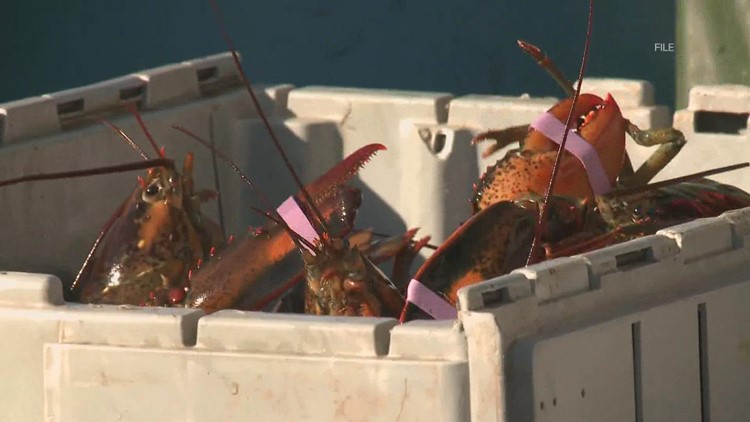MAINE, USA — After Maine leaders held an impassioned press conference last week calling on the Monterey Bay Aquarium's Seafood Watch to remove lobster from its seafood "red list," they've now issued a letter urging retailers to reconsider the Seafood Watch recommendations.
The Monterey Bay Aquarium Seafood Watch labeled American lobster—and Maine lobster, individually—as products to avoid buying and selling, citing ongoing threats the fishing industry poses to the endangered North Atlantic right whale.
The Seafood Watch nonprofit carries weight. It lists major companies like Whole Foods and The Cheesecake Factory among thousands of business partners. Two meal-kit companies linked to the Watch, Blue Apron and Hello Fresh, already pledged to stop offering lobster.
In their letter Monday, Sens. Susan Collins and Angus King, Reps. Jared Golden and Chellie Pingree, and Gov. Janet Mills encouraged retailers and restaurants to consider the issue independent of Seafood Watch's "red list" warning.
“Monterey Bay’s Seafood Watch Program has produced recommendations based on claims and false assumptions that ignore scientific principles that should underpin any legitimate ratings,” the Maine leaders wrote. “To impose a ‘red’ designation grounded in inaccurate and incomplete information severely undermines the credibility of the report’s recommendation.”
The group argued there are no documented cases of Maine lobster gear ever killing a right whale, and the last entanglement was in 2004, while Maine boasts the largest lobster fishing industry in the United States.
Monterey Bay Aquarium Vice President Jennifer Dianto Kemmerly spoke with NECN on Tuesday about the decision and said no one wants their appetite for seafood to drive a species to extinction. She added that the vast majority of entanglements go unreported.
“Now, science indicates most entanglements aren’t recorded: 90 percent can’t be linked to a particular gear type,” she argued. “So, that’s the evidence we’re looking for.”
Maine leaders said fishermen have taken multiple steps to prevent entanglement, including removing 30,000 miles of rope from the water, using weaker lines and adding breakpoints to them, and closing sections of water to fishing.
“We urge you to consider these facts as you seek to provide customers with seafood options that are not only caught in the U.S., but also from a sustainable fishery,” the Maine leaders wrote. “The Monterey Bay Aquarium’s recommendations lack credible evidence, but if followed, will have real-world implications for the thousands of hardworking lobstermen and women, their families, and our businesses across Maine.”
Read the full letter below:
The Maine Lobstermen’s Association is appealing a federal judge's ruling that rejected its lawsuit challenging new restrictions on the harvesting of lobster off the Maine coast.
The MLA filed the lawsuit in September 2021.
U.S. District Court Judge James Boasberg denied the MLA's request in a Sept. 8 ruling.
When announcing its appeal to the United States Court of Appeals for the District of Columbia Circuit in a release Monday, the MLA called the federal whale plan "scientifically-flawed" and "draconian."
“We refuse to let a single judge’s decision be the last word,” MLA President Kristan Porter said in the release. “The facts are clear. Maine lobstermen are not driving the whale towards extinction. There has never been a known right whale mortality associated with Maine lobster gear, and there has not been a single known right whale entanglement with Maine lobster gear in nearly two decades.”
“If we have to go all the way to the Supreme Court to protect our hardworking families and preserve coastal communities with a multi-generational heritage of wise stewardship, that is what we will do," Porter added.
The MLA argues the National Marine Fisheries Service acted arbitrarily when it failed to rely on the best scientific information, account for the positive impact of conservation measures already adopted by the Maine lobster fishery, and designed a plan the MLA said is aimed at curing unrealistic “worst-case scenarios."
“The Maine lobster industry faces punishing, unnecessary regulatory restrictions in a careless effort to save endangered whales,” Patrice McCarron, executive director of the MLA, said. “After working for years with federal regulators and other stakeholders, and after pleading our case to a federal court that never addressed our well-documented concerns with scientific deficiencies, the Maine Lobstermen’s Association is escalating its fight to save Maine’s lobstering heritage from a plan that the agency itself admits is not needed for the species to survive.”



